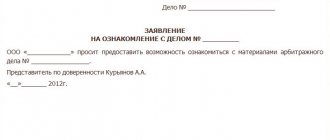Samples of applications and petitions
This section of the site presents various types of applications and petitions to the court. All documents are developed in accordance with Russian legislation and are valid throughout the Russian Federation and CIS countries. Anyone who visited the site can download sample statements and petitions to the court to fill out. Petitions and applications to the arbitration court are accepted using the electronic document submission form on the official website of the Arbitration Court.
All types of statements of claim to the arbitration court are presented on the page Sample statements of claim.
Also on the website, in the section Samples of agreements with an arbitration clause, there are presented Agreements with an inserted arbitration clause, according to which all disputes are referred to the arbitration court. You will find other types of contracts and agreements on the page Samples of contracts and agreements.
| Application for appointment of a case at an earlier date |
| Application to the competent court for a writ of execution against the arbitration tribunal's decision |
| Application for refusal to obtain a writ of execution by the arbitration court |
| Request to send court documents to the address |
| Petition to leave the claim in the Arbitration Court without consideration due to the existence of an arbitration agreement |
| Application for deferment (installment plan) of payment of state duty |
| Application for change of address |
| Email Notification Statement |
| Application for inclusion of documents in the case file |
| Petition for approval of a settlement agreement in the absence of the parties (plaintiff, defendant) and for consideration of the dispute on the basis of written materials |
| Request for familiarization with the case materials |
| Application for the elimination of clerical errors, typos and arithmetic errors made in the court decision without changing its content |
| Petition for approval of a settlement agreement |
| Petition for appointment of an examination |
| Petition to suspend proceedings in the case |
| Petition to involve a third party in the case |
| Request for evidence |
| Application for recognition of claims |
| Application for clarification of claims |
| Application for return of original documents from the case |
| Application for a copy of a judicial act |
| Application for replacement of a party (procedural succession) |
| Application for reduction (increase) of claims |
| Application for review of the arbitration case due to newly discovered circumstances |
| Application for refund of arbitration fee |
| Application for securing a claim |
| Application to reject the plaintiff's request to take measures to secure the claim |
| Request for consideration of the case in the absence of the applicant |
| Petition to terminate the proceedings |
| Petition to involve a third party in the case who does not make independent claims regarding the subject of the dispute |
| Request for return of the statement of claim |
| Request to call a witness to participate in the arbitration process |
| Motion to postpone the trial |
| Application for participation in a court hearing through the use of video conferencing systems |
In what cases will it be necessary
The Civil Code states that both parties to the trial must provide the court independently with all the necessary evidence confirming the correctness of their stated arguments. Moreover, in almost every process there are certain circumstances that make the provision of this information difficult or even impossible.
For example, a citizen needs to obtain a certain document that is related to commercial, banking or some other type of secret protected by current legislation, and therefore even companies or government agencies will not be able to obtain it on their own.
In the vast majority of cases, we are talking about a certificate indicating the amount of income of various individuals, credit history, history of telephone conversations and other similar data.
All these situations are regulated in part 1 of Article 57 of the Code of Civil Procedure, which states that the court must provide all necessary assistance to each of the parties in collecting and requesting any evidence requested on the basis of the filed petition.
Petition for the collection of evidence in the arbitration process
Its execution is regulated by Article 66 of the Arbitration Procedure Code and has similar content requirements as in civil proceedings. In addition, the arbitration court has the right to request information on its own initiative:
- if documents were not provided by state bodies in cases arising from public legal relations (clause 5 of article 66 of the Arbitration Procedure Code of the Russian Federation);
- if the applicant did not provide materials in the case of collection of mandatory payments and sanctions (clause 5 of Article 215 of the Arbitration Procedure Code of the Russian Federation);
- if the foreigner has not provided official confirmation of his legal status or right to engage in business or other economic activity (clause 3 of Article 254 of the Arbitration Procedure Code of the Russian Federation).
If the court is not convinced by the arguments presented in the petition and it refuses you, then its decision can be challenged and the petition can be submitted again at the next instance.
What evidence can be required
The legislation does not reflect an exact list of documents that can be obtained by sending a petition to the court to request documents in a civil case. In fact, any papers are provided. It is only important that they are directly related to the proceedings.
Note! The request is not always granted. The court will agree to request documentation if the person proves that he does not have the opportunity to obtain the necessary information in another way.
It's easier to understand with an example. So, a woman who wanted to collect alimony filed a lawsuit against her ex-husband. She had to apply for a certificate of income. She herself could not obtain the relevant document, since current legislation protects information about income. The court agreed to satisfy the demands. In the current situation, a petition was considered the only legal way to obtain the necessary information.
Features and design rules
In accordance with procedural law, the petition must have the following structure:
- Introductory part. Includes a “header” that indicates the name of the court, full name. and the applicant's contact details, as well as the case number.
- Main part. Here you need to outline the essence of your request: what information needs to be requested, what legally significant circumstances it confirms, why you cannot get it yourself, and who has it.
- Resolution part. In this paragraph, it is necessary to indicate the requirement itself, for example, “I ask you to request reports of road accidents from the Krasnensky Ministry of Internal Affairs of the Belgorod Region.”
- Your signature and date of application. This is followed by a list of applications (if necessary).
Possible results of requesting documents in civil proceedings
The additional information that the citizen provided in the petition is considered taking into account all known circumstances. Additionally, the court will take into account the opinions of other participants in the process. They may support the petition or advise that reviewing the document will not be beneficial.
Video
If the court decides to grant the petition, the applicant may be provided with an official request, with which he will go to other authorities. An alternative is for the judge to independently request information. He will contact the organization or person who has the required information. According to the law, the court does not have the right to refuse to release data. If a negative response is provided to the request, the action is considered a violation. It entails the imposition of an administrative fine in the amount of 500 rubles. for citizens and 1000 rubles. for officials. However, the application of a monetary penalty does not relieve the need to provide additional information.
Submitting an application
As mentioned above, the petition is submitted in writing to the judge’s secretary or through the office of the body that is handling the said trial. In this case, the applicant will have to ensure that the submission of his application is reflected in the process of filling out the minutes of the meeting or that his document is assigned a unique number in the register of incoming documents.
Special attention should be paid to the fact that it is best for the party who files the relevant petition to think in advance about how to behave during the first trial and how exactly to approach the court in order to request the provision of all the necessary evidence. Thanks to such preparation, the duration of the consideration of the case can be significantly reduced.
Other participants in the meeting have every right to study the independently submitted petition, and then, if necessary, file an objection against it. In the vast majority of cases, the parties do not have any disputes regarding the filing of this document, since in itself it mainly has an exclusively technical function.
If it is necessary to obtain certain information for the correct conduct of the trial, without studying it, meetings will be regularly adjourned, and the decision will be postponed indefinitely.
We should also not forget that a person who has a certain list of documents or other information necessary during the trial may handle them carelessly, which is why they may ultimately be partially damaged or completely lost. It is for this reason that any delays in this situation can lead to the fact that a participant in the process will, in principle, lose the opportunity to obtain evidence and correctly substantiate his position.
The nuances of submitting a ready-made petition to the court
The document must be prepared in writing. The petition must be submitted to the court directly during the hearing. The document is handed over to the judge. Additionally, you can submit one copy of the application to the office of the institution. The document is marked with acceptance. An alternative is to send the paper by registered mail. It is permissible to submit a motion at any stage of the proceedings. The court hears the opinions of other participants in the process on this matter.
Video
How to substantiate claims in a petition
The court will not provide data just like that. The citizen will have to indicate for what purpose he is requesting evidence. It is important to clarify what information a person wants to know when receiving materials of interest. Then you need to explain why it is impossible to obtain evidence without the assistance of the court. To do this, you need to provide a link to legal norms or an official refusal. If a citizen has documents confirming that his application was rejected, the documents must be attached to the application. They will prove that the arguments presented are true. The judge will carefully consider the request and then make an appropriate decision.
Please note: The applicant's requirements are not always satisfied. A negative answer can be obtained if the judge considers the request to be unfounded. The legislation does not provide for the possibility of appealing the decision.
How to compose it correctly?
A petition to request documents must contain the following information: information about the author of the application: Full name. (name of organization), residential address; name of the court; document's name; description of the case: number where it is being considered, the subject of the dispute, information about the parties; a brief description of the main circumstances of the case; an indication that Article 56 places the burden of proof in civil proceedings on the party who refers to the circumstance; a description of where and why the required item is located; an indication that the applicant has no legal basis to oblige the owner to provide the necessary evidence (preferably with reference to the law); link to Article 57 of the Code of Civil Procedure of the Russian Federation; description of the requirements: what to demand and from which person; list of attached documents; signature, date, surname and initials.
The petition will be granted if the fact cannot be established otherwise. In cases where a participant in a legal dispute has other means of proof, he must use them and not involve another person in the process. Also, the circumstance confirmed by requesting evidence should influence the court’s assessment of other facts. The petition must be drawn up taking into account the facts to be proven, the position of the party, the requirements of the plaintiff and other circumstances. The court does not grant the request in all cases. The application may be rejected if the government body does not consider it necessary to establish the facts specified in the application during the proceedings. Or it will be established that a person has access to another method of obtaining evidence, albeit longer in time or requiring additional material costs.





